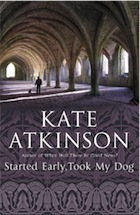|
An elegaic tone creeps in to Atkinson's latest but the author's
control of her fictional universe is total, writes Justine Jordan
 |
|
Write on ... Kate Atkinson has found the mark again with her
latest Jackson Brodie mystery. Photograph: Marco Secchi/Rex
Features |
Kate Atkinson's novels have always been built around lost
girls, from the Whitbread-winning family saga
Behind the Scenes at the Museum to her current bravura
crime series. This is the fourth book to feature "semi-retired" private
investigator Jackson Brodie, a tender curmudgeon and solver of mysteries
whose appeal lies in the fact that he remains a mystery to himself. Over
the four novels Atkinson has painted Jackson into a fractured universe
of missing wives, near-death experiences, exploded houses
and estranged lovers, but the absence nearest to his
heart – his "own dear grail" – remains his sister Niamh, murdered as a
teenager in a brutal crime that was never solved.
The wonder of Atkinson's novels has been their joie de vivre,
extraordinary given the high incidence of violent death. An
irrepressible exuberance shines throughout, as well as a reliance on
coincidence and resistance to neat resolution, both of which run counter
to the standard pleasures of the crime genre. However, parts of
Started Early, Took My Dog are bitterly bleak, world-weary and
almost elegiac in tone, conscious of approaching ends as well as
mysterious beginnings.
As the novel opens, Jackson is searching not only for the "lost pastoral
England that was lodged in his head and his heart", but for the "fake
wife" who absconded with his fortune and the real parents of his current
client, adoptee Hope McMaster, who appears to have sprung from nowhere.
This quest leads him on a pleasurable travelogue around Yorkshire's
ruined abbeys and genteel tea shops, and thence to Leeds. There the
lonely, retired police officer Tracy Waterhouse encounters a screaming
child being dragged around a shopping centre by a "prostitute, druggie,
thief, all round pikey" named Kelly Cross and in a moment of highly
unbelievable madness buys the girl for ready cash.
As Tracy goes on the run with little Courtney, Jackson's investigations
– and other investigations he doesn't know about yet – disturb a
long-buried crime from the 1970s: a murdered prostitute, a missing
child, a police cover-up. Also in Jackson and Tracy's orbit is ageing
actress Tilly, who with her slipping wig and handbag full of knives and
forks is beginning to lose herself to dementia and, worst of all, to
lose language ("all her words turning into mush . . ."). The book's
scheme folds past and present together with Atkinson's customary flair,
while in Tilly's mind the two coalesce, her memories running into the
present like ink. Senility is a remembering as well as a forgetting – a
career's worth of lines, fragments of poetry and prose, rising unbidden
in her brain.
Tilly is not the only one feeling her age: this is a book about the
bruising passage of time, and whether we grow hardened to the world or
become raw with rubbing against it. "It's your age," says Jackson's most
significant ex, Julia, explaining his new weakness for sublime
landscapes and Emily Dickinson poetry; he in turn finds her a paler
version of herself now she's mellowed by time and motherhood. Tracy,
meanwhile, "had retired with a shell so thick that there was hardly any
room left inside". The past is a "lost continent" for everyone, the
whole book a wondering comparison of the good – or bad – old days with
the strange new present ("Men weren't what they used to be. If they ever
had been"). Characters ask themselves when men stopped wearing hats,
when women started behaving like men. Atkinson's portrait of 1970s
Leeds, in the shadow of the Ripper, carries echoes of David Peace's Red
Riding trilogy – "the past was a dark place, a man's world" – but of
course the sexism and corruption live on into the present day.
It's not lost on Tracy that in her desire to mother Courtney – to make
up for all the others by saving one lost girl, "one fallen fledgling
popped back into the nest" – she is dragging the child through danger
and confusion. Courtney is the mystery at the heart of the book, an
unreadable presence in a tattered fairy outfit, unavoidably reminiscent
of this era's most famous lost girl,
Madeleine
McCann. But Tracy's awkward transformation into would-be
parent is wryly moving, and Atkinson swerves the obvious sentimentality
by channelling it all into Tilly, who has her own pity-soaked memories
of maternal heartbreak. Tracy's new role is also mirrored by Jackson's
adoption of a particularly winning dog, also rescued from an abusive
supposed-carer (the difference between mistreating a child and a dog in
public being that passers-by are much more willing to intervene on the
dog's behalf).
So much of the narrative is retrospective or interior that there's not
much urgency to unfolding events, however highly coloured. And there's a
rhetorical whimsy reminiscent of some of Atkinson's earlier books, a
devil-may-care gesturing at the novel's own fictionality, which can
leave the characters threatening to float free of our trust in them. But
we follow their digressive, meandering voices avidly as they circle
around their own particular loves and losses, all knitted together with
Atkinson's extraordinary combination of wit, plain-speaking, tenderness
and control. She's an old hand at paradox now: "All roads lead home,"
says Julia. "All roads lead away from home," Jackson replies. |



